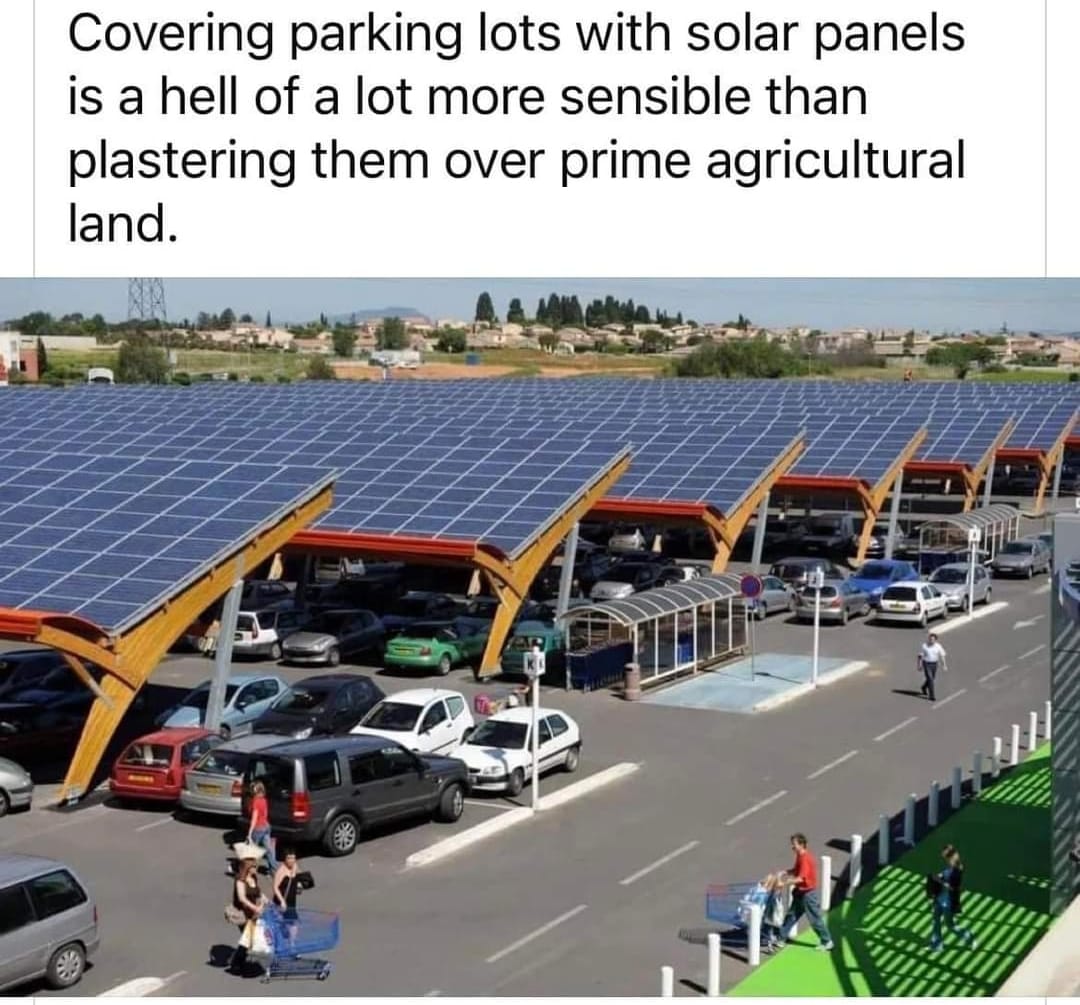this post was submitted on 13 Jul 2024
1042 points (99.8% liked)
196
16613 readers
2086 users here now
Be sure to follow the rule before you head out.
Rule: You must post before you leave.
founded 1 year ago
MODERATORS
you are viewing a single comment's thread
view the rest of the comments
view the rest of the comments

Keeps cars cool, can be used to charge EVs. Yeah, sounds good. Make the parking lot only partly covered and those spaces EV only to encourage the transition.
Why would you need to dedicate the output to a specific goal? We already have a good target for all new renewable energy facilities - to reduce the need for fossil fuel. Just feed it back to the power grid.
Also - are you suggesting to "Make the parking lot only partly covered" just because want to give EVs the better (shaded) spots? Seems like a waste of the extra energy you could get by covering the entire lot...
I'm not sure photovoltaics would generate enough juice to recharge a vehicle during 30-60 minute shopping trip. Certainly not on the current iteration of electric vehicle charging capacity.
This is a good use of space and a potentially beneficial way to generate power for the storefront (AC and refrigeration during peak hours are real electricity hogs and would tie out with available sunlight), but idk how effective it would be at recharging vehicles. Not unless the space also has large reserve batteries that can discharge rapidly, and the solar cells were exceptionally efficient at generating wattage.
This is, incidentally, why wind plants get you more bang for your buck than solar plants. The supermassive turbines out along the Corpus Christi coastline can generate north of 3 MW/h. Meanwhile, you'd need 75,000 sqft of 200-watt 5' panels to generate an equivalent. Electric car batteries hold somewhere between 40-100 kWh of power. So getting the math to work is a bit tricky.
Or it could just be a nice fringe benefit. It doesn't have to fully charge your car, just a little trickle charge, enough to cover the trip there perhaps. I feel like it's be enough output to at least do that much, combined with being a shaded spot.
Throwing up some canvas shades is a hell of a lot cheaper than adding big integrated solar panels overhead.
I've got an electric plug-in hybrid. Even with a relatively small batter (50 mile range) and an eight hour overnight charge time, I can't bring it up to full. An hour of trickle charging is going to get you a few miles of driving, tops. Idk if the infrastructure investment for all the little charging terminals is going to be worth the return, relative to - say - powering the business itself.
One way to think of it is that if photovoltaics are cheap and efficient enough to be used in general all over the grid and be worth the investment, then if you’re building a structure with the sole purpose of blocking the sun it may be a good candidate!
Plus since the cost involves a large investment of capital over a long period of time, revenue from the energy generated might make it profitable at the end of her day.
Right, point would be that the energy only funnels into a car when the space is occupied, else it goes into powering the building. Is it fantastical and cost prohibitive right now, sure, but it's an idea that could be implemented when it's less so. These technologies get significantly cheaper over time.